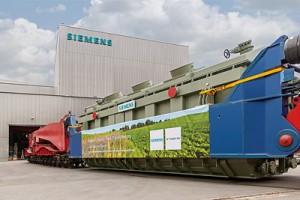Siemens has produced the world’s first large-scale transformer that uses oil from renewable vegetables resources, making its operation more environmentally friendly and less flammable.

The device will link the 380-kV ultra-high voltage level with the 110-kV grid in the Bruchsal-Kändelweg substation plant near Karlsruhe, Germany.
A transformer increases or reduces the alternating current level for transporting electricity and because of the high currents and voltages, it heats up and must be cooled down with oil, explains Siemens on their website. The transformers are usually cooled and insulated with mineral or silicone oil, which are good for dissipating the heat effectively and providing good insulation against electric sparkover. However they are harmful to the environment and highly flammable.
In contrast, biodegradable oils such as rapeseed, soy, or sunflower oils have a much higher flashpoint. The transformer run by vegetable oil can be operated without additional protective equipment such as collecting tanks, even in zones that adhere to strict environment requirements. Because they have better safety class, vegetable oil transformers can be used even in densely populated residential areas.
Siemens’ new transformer is designed for 420 kV, weighs just under 340 tons, and contains 100 tons of insulating oil coming from renewable sources. As a result, it is the world’s first power transformer on the 420-kV ultra-high-voltage level that does not require proof of its water hazard classification, according to the company.
Grid operator TransnetBW located in the German state of Baden-Württemberg, will place the environmentally friendly transformer into operation in late July.




















